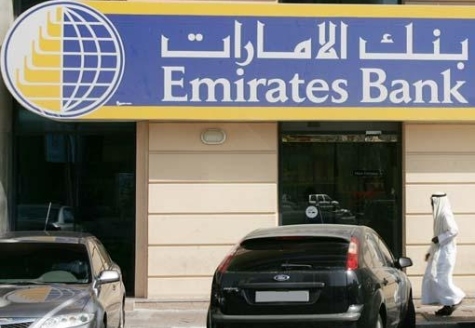The emirate’s banking sector is still working to shake off the lingering effects of the global financial crisis, with lenders having to make higher provisions for debts than some of their neighbors who were less encumbered when the global economy went into decline.
A number of Dubai’s leading banks are still contending with high levels of debt exposure to state enterprises, a factor that may continue to affect their earnings for some time to come, as clearly indicated when lenders issued their second-quarter statements in late June.
For the fourth quarter in a row, Emirates NBD saw its profits fall, with Dubai’s largest bank in terms of market value recording a 13% drop in earnings. While some of this can be attributed to rising costs, the bank also had to make further provision for debt linked to state-owned entities, with the $100m provision for Dubai Holding restricting net profits to $176.1m for the second quarter. According to a statement issued by Emirates NBD on July 23, this took the bank’s total provisioning to 32% of its $1.25bn exposure.
“The classification of government-related entities has clearly impacted profitability through the direct impairment provisions taken, as well as the ongoing cost of carry on non-performing or restructured loans,” the bank’s CEO, Rick Pudner, told OBG. “Nevertheless, at Emirates NBD the level of pre-impairment operating profit has remained robust and stable throughout the challenges of the last few years, enabling the bank to absorb these impacts whilst maintaining bottom-line profitability and dividend payouts.”
Commercial Bank was another that reported weaker earnings for the quarter, again attributing the results to higher impairment provisioning, which rose by 27% to $53m, and shaved net profits by 7.2%, compared to the same period in the previous year. Though earnings may have been down, Peter Baltussen, the CEO, was positive that the bank was well placed to deal with what he described as a challenging economic environment.
“Whilst uncertainties in the wider global economy persist, we are reasonably optimistic with regards to the UAE economy,” Baltussen said on July 18, when the bank released its second-quarter results, adding that “The bank’s liquidity and capital strength ensures that it is well-positioned to benefit from an economic recovery.”
Although the basic fiscal position of Dubai’s banks remains solid, with liquidity levels well above the adequacy rates set by the UAE’s central bank, events beyond the emirate’s borders could delay the economic recovery that Baltussen hopes to benefit from.
The deepening sovereign debt crisis in Europe could take some of the momentum out of the Gulf region’s own rebound. Analysts do not expect a deepening of the Eurozone crisis to have a significant direct impact on banks in Dubai and the Gulf region as a whole, as their lending and investment exposures are generally limited, but a return to global recession or something close to it will have a flow-on effect on the emirate’s banking sector. With even some of Europe’s leading banks coming under pressure – banks that hold credit notes of some of Dubai’s leading corporations – there is a chance that the continent’s debt crisis could send ripples through the local financial sector.
Many of the government’s largest enterprises are still in the process of working their way back to profitability and clearing their debts, which were mainly accrued during their rapid expansion during the first half of last decade. While there have been some notable successes in this process, such as Dubai World’s reorganization of its $25bn worth of loans, other entities are still working to reach an accommodation.
One such is the Dubai Group, which is continuing to work toward an agreement with creditors over restructuring some of its loans. A further drawing out of the 18-month negotiation process could hurt some local banks, which are also exposed to the corporation’s debt. In early July, Royal Bank of Scotland, Commerzbank and Standard Bank all suspended talks with Dubai Group over restructuring approximately $10bn of debt, and while analysts are optimistic that a settlement can be reached, concerns will linger that the rebound of Dubai’s economy could lose some of its momentum.
It is expected, however, that agreements will eventually be reached with the creditors of Dubai’s state-owned companies that need to reorganize their debts, which will lift the stocks of those local banks finding themselves exposed. With the restructuring process finalized, Dubai’s banks should be on firmer ground.
Oxford Business Group
22 August























































